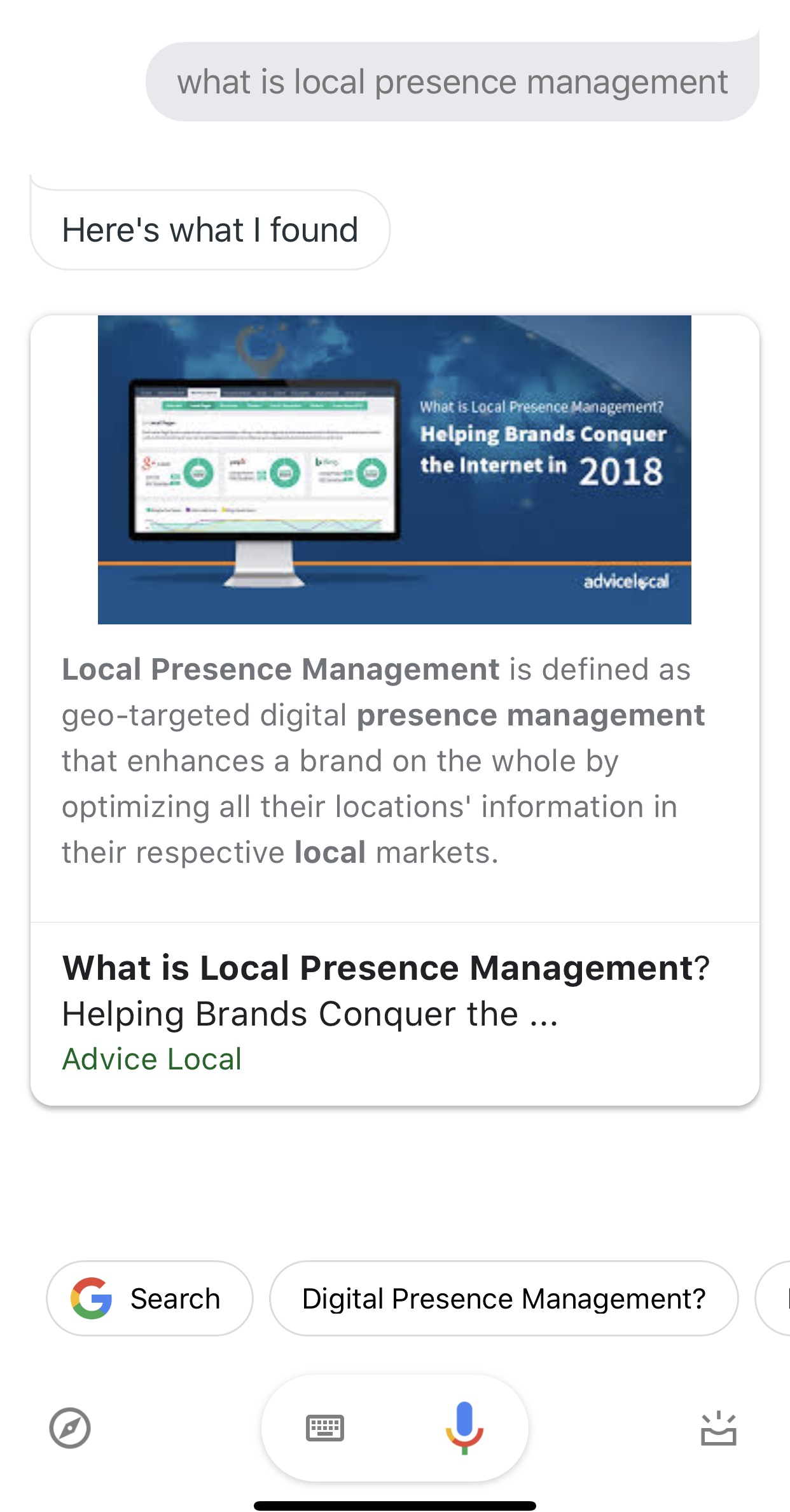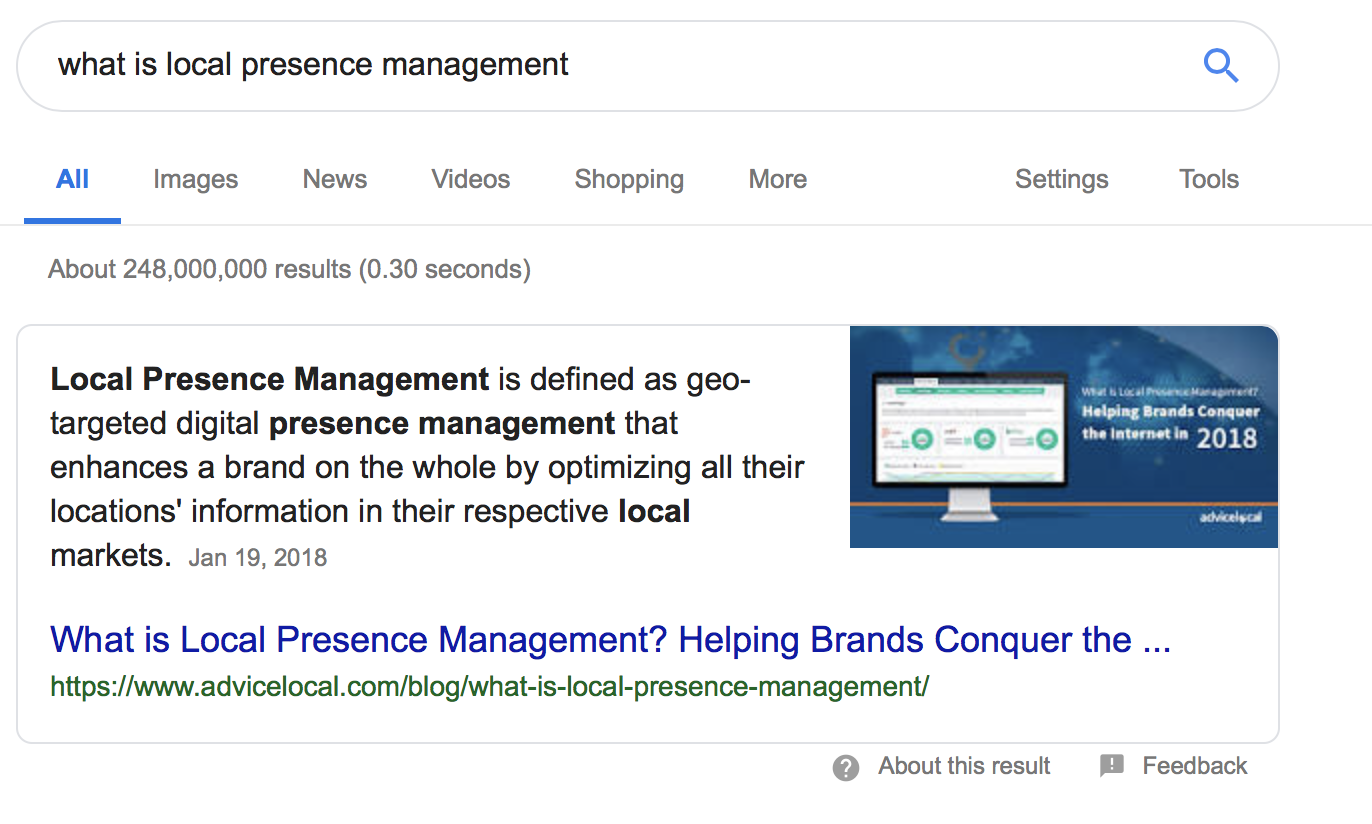By now, you’re probably sick and tired of hearing me herald the coming of voice search. The thing is, I’m not going to stop anytime soon. People are searching more and more with their voice assistants and smart speakers, and we all need to be prepared for that to continue. Voice search ranking factors are more important than ever to make sure local businesses are voice search-ready. Local businesses’ websites, blogs, and SEO strategies aren’t going to optimize themselves for voice search!
Last year, Backlinko conducted an extensive analysis of the factors that seriously impacted voice search rankings. Unsurprisingly, 11 different variables were tied specifically to results that the Google Assistant pulls up via Google Home. When I read their study, you know I had to do my own research to test their theories. After all, Google dominates the search world, so these ranking factors likely apply to other voice assistants, like Amazon’s Echo and Apple’s Siri.
The Gist on Voice Search Ranking Factors
For my research, I used one of Advice Local’s pages that is voice search-ready and ranking in the Google Assistant.

I tested all of Backlinko’s voice search ranking factors against our very own page.
Page Speed/Loading Time
We all know that websites need to load quickly in order to compete, and it’s no different when it comes to voice search SEO. Backlinko’s study reveals that the average voice search result loads in just 4.6 seconds. Typically, Google considers a page to be “mobile friendly” when it loads above-the-fold content in one second or faster.
Our page for “What Is Local Presence Management?” has a page speed of 3.02s.
Users want immediate results when they use voice search. Whether they’re asking for help with homework or looking up directions, their smartphone or voice assistant needs to respond quickly. As a result, slow-loading pages will almost never be included in voice search results.
HTTPS Websites
After Google did that whole thing over the summer with unsecure sites – you know, letting people know that a site was not secure before proceeding – it’s no surprise that site security is a big ranking factor not only for voice search, but for search in general as well. Google wants to protect its users, which means it’s more likely to send searchers to a secure webpage than one that’s questionable or unprotected.
What we didn’t know until recently is that secured websites are even more valuable in terms of voice search than they are in desktop searches. Backlinko found that voice search results tend to use HTTPS 20 percent more than other results on Google’s first page.
I can confirm that our website is and has been secure for quite some time, which adds value to Backlinko’s claim that HTTPS is a voice search ranking factor.
Brief, Informative Answers Inside In-Depth Content
Now we get to the meat of what’s important when it comes to ranking in voice search. When you type a query on Google, you might browse the entire first page of search results to find what you need. When you ask a question to a voice assistant, Google provides you with one or a couple of answers that best satisfy your needs.
It’s vital that businesses alter their content to answer specific questions. The typical voice search result is only 29 words in length, although it may come from a blog or post that’s more than 2,000 words long, according to Backlinko.
The Advice Local article I used to test the theory contains 501 words, but our definition of local presence management is found in the first paragraph and is both brief and informative:
“Local Presence Management is defined as geo-targeted digital presence management that enhances a brand on the whole by optimizing all their locations’ information in their respective local markets.”
The answers hidden in long-form content need to be clear and precise, but that doesn’t mean the content should be short. While the content in our article was not too long, it was in depth and authoritative – like all of our content.
Marketers should also keep in mind that simple, easy-to-read content may help with voice search SEO. The average Google voice search result is written at a 9th-grade level, which makes sense considering the brevity and simplicity of most voice search answers. Roughly 93 million people in America have “Basic” or “Below Basic” literacy skills – don’t exclude them by writing above their level. This isn’t the time or place to make pieces flowery. Stay on topic and keep things straightforward.
Authority Over Subject Matter
Since voice assistants only provide one answer to users at a time in most cases, Google needs to know that the answer comes from a trustworthy, authoritative source. In order to benefit from voice search SEO, content must exude expertise. For instance, Google is much likelier to answer the question “What are the signs of measles?” with a result from Mayo Clinic, an expert, than with a result from a mommy blogger.
This is also the case with a SEO topic like “What Is Local Presence Management?” The result comes from a trusted site that consistently crafts content related to local SEO, listing management and other forms of digital marketing.
One way to help build authority in a field is to share the content with others in the industry. Content with high levels of social engagement tends to perform well when it comes to voice search. Share the post on Facebook, get people to Tweet about it, and don’t hesitate to toot your own horn. Backlinko states that the average voice search result has 1,199 Facebook shares and 44 Tweets. Those shares are indications to Google that other people trust and appreciate the content.
We are very active on social media. We share our content on Facebook, Instagram, Twitter and LinkedIn, which also helps position us as an authoritative source in the SEO and digital marketing space.
Featured Snippets and High Rankings
Once again, I’m going to bring up the Featured Snippet. You’re probably groaning considering that I’ve brought it up countless times, but there’s a reason: it’s one of the most vital aspects to succeeding with voice search. Businesses are much more likely to be featured in a voice search result if they own the Featured Snippet for a particular query. In fact, according to the Backlinko study, 40.7 percent of all voice search answers come from Featured Snippets.
Of course, we have the featured snippet for local presence management.

When it comes to ranking with Google, many of the same rules apply to voice search as they do to desktop search. If one of the business’ articles is ranking highly on desktops, then it stands a fair chance at appearing in a voice search. The key is to reach one of those top three spots on Google – 75 percent of the voice search results come from there.
Strong Backlinks
This factor goes hand in hand with authority. Google wants to find voice search results that offer expertise in their domain. One indication of this reliability is a strong backlink profile. The more a website can establish domain authority, the more Google will believe it’s a trustworthy source worth passing on to voice search users.
Advice Local is a very cited source, as we are considered an authority when it comes to local SEO and other digital marketing topics. Our page about Local Presence Management has 19 backlinks from trusted sources. Advice Local as a whole has over 71k!
The Bottom Line on Voice Search Ranking Factors
Right now, Siri is used on over 500 million devices. Google Assistant is used on more than 400 million, according to Voicebot AI. Voice search has steadily increased in popularity over the past couple of years, and all signs point to a future filled with voice searches.
If you find that a local business is not voice search ready (have you taken our voice search readiness test yet?) pay attention to these factors, as they may be the reason why the business is not getting found in voice searches.
Now is the time for local businesses to begin optimizing their content and websites for voice search results. If you need help preparing your local business clients, request a demo today!




